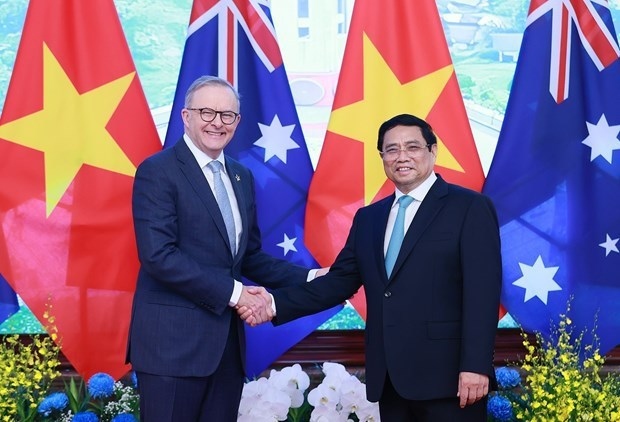
Vietnam’s “bamboo diplomacy” has been a hallmark of its engagement with the international community, stated Former Governor-General of Australia Peter Cosgroven in an interview granted to the Vietnam News Agency (VNA) on achievements of the “bamboo diplomacy”.

To an Australian, the features of this approach – a firm foundation of ideals with the ability to accommodate the world as it is – are very familiar, he stated.
Australia’s foreign policy is similarly characterised by purpose, principle and pragmatism. The country applies Australia’s own agency to the task of securing its interests – anticipating the future and charting a course through it. That is why the Australian Government has made deepening engagement with Southeast Asia a top priority. “I believe the strong strategic trust between our two nations is grounded in this shared perspective,” he said.
Cosgroven underscored that Australia respects Vietnam’s role as a leader in ASEAN. This has stemmed from a confidence in Vietnam’s conduct of foreign affairs, to know how to work with close neighbours and partners to shape a stable region that allows for the prosperity and security of all. Australia sees Vietnam as playing an important leadership role in the Mekong subregion. Its engagement in institutions like the Mekong River Commission ensures strong coordination on transboundary water issues, climate change, and food security.
Australia has also supported and commended Vietnam’s leadership on the East Sea, particularly promoting the role of international law through UNCLOS (United Nations Convention on the Law of the Sea) – a position Australia shares.
Regarding the relations between Vietnam and Australia, he said that Vietnam is an enduring partner and friend of Australia, and it is momentous that this year the two countries are celebrating 50 years of diplomatic relations.
Australia and Vietnam enjoy vibrant trade, investment, education and defence links. Vietnam’s impressive economic growth is being watched by Australian companies. The Australia‑Vietnam Enhanced Economic Engagement Strategy has set the two countries on a course to expand their connections, and to expand cooperation to cover the digital transformation and digital economy. Already Vietnam has become Australia’s 12th largest trading partner. There is significant potential to take bilateral trade and investment relationship further.
Australia has been a consistent and reliable partner in Vietnam’s development, having delivered over 3 billion USD in official development assistance. Over the years, it have adjusted its approach to meet Vietnam’s rapidly evolving needs. It was Australia that helped build the electricity connection between the North and South of Vietnam, the first satellite links for telephone calls, and the first undersea cable.
These links are also evolving as cooperation between Australia and Vietnam expands into climate change, energy and the environment. This is underpinned by Prime Minister Albanese’s commitment of 105 million USD to support Vietnam’s sustainable economic growth and energy transition. The partnership is further enriched by close people-to-people bonds and the contribution of the more than 300,000 Australians of Vietnamese heritage to the Australian society.
Meanwhile, Indonesian scholar and journalist Mohammah Anthony said that Vietnam’s current diplomatic policy, developed by President Ho Chi Minh, has been creatively and flexibly applied to suit the domestic and global situation in the new period.
The former senior editor of Indonesia’s Antara News Agency said that Vietnam has adjusted its external policy to become more open, with the key factors being Vietnam’s economic and political interest.
The highest interest of Vietnam in its external relations is maintaining peace for development, which means a peaceful and favourable environment for renovation and socio-economic development efforts towards socialism, along with the goal of wealthy people, strong country and firmly safeguarded independence, sovereignty and national security, he said.
According to Anthony, the major principle in all foreign activities of Vietnam is to protect the nation’s independence, unity and socialism, and to optimise the country’s creativity, dynamism and flexibility to suit the domestic, regional and world situation.
He also highlighted Vietnam’s external relations principle of staying firm in principle and flexible in methods.
Anthony underlined that Vietnam has built its own diplomatic and external relations style since President Ho Chi Minh era, featuring the typical characteristics of Vietnamese bamboo – strong root, sturdy stem, and flexible branches. It is a combination of patriotism, national culture, traditional diplomacy and the quintessence of the culture and diplomatic experience of the world, he said.
He noted that Vietnam has shown strong economic growth towards sustainable development. The country’s “Doi Moi” (Renewal) cause started in 1986, turning the country from an underdeveloped country with 90% of the population working in the agricultural sector into one of the most dynamic economies in Asia with diverse bilateral and multilateral relations.
Commenting on the relations between Vietnam and Indonesia, Anthony said that the two sides share many similarities in culture and history, and have enjoyed sound and growing ties in many areas.
He noted that in June 2013, the two sides lifted their bilateral relations to a strategic partnership, which is an important milestone in the bilateral relations, showing the efforts of high-ranking leaders and consensus of peoples of the two countries. On the occasion of the 10th anniversary of the bilateral strategic partnership, they shared a hope to bolster cooperation in all fields from diplomacy, politics, economy, socio-culture and people-to-people exchanges, he said.
Bình luận
Bình luận của bạn sẽ được xét duyệt trước khi đăng